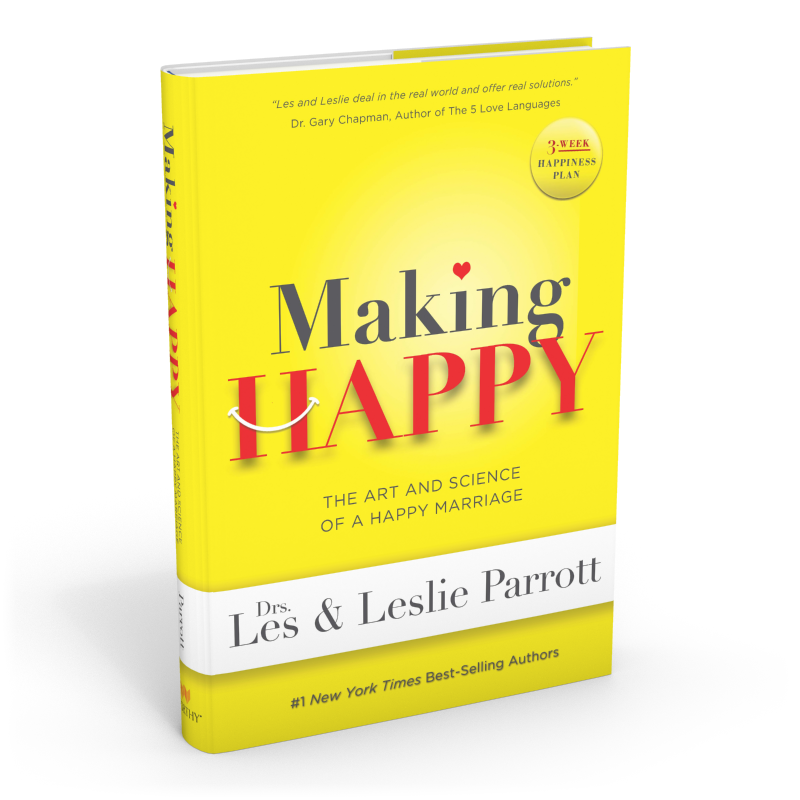A soft answer turns away wrath, but a harsh word stirs up anger.
The tongue of the wise commends knowledge, but the mouths of fools pour out folly.
Proverbs 15:1-2
We have our share of critics. Like all authors, you learn to take the good with the bad.
But several weeks before the release of our latest book, Making Happy, we did an interview with a London newspaper, The Daily Mail, which generated some critical comments (among many positive ones) that got us laughing:
“What a load of tripe. Total rubbish”
“I think the Parrotts should use this book to line their cage with.”
“Wot tosh.”
“The Parrott’s look a right pair of plonkers.”
We don’t know what a pair of plonkers look like but we are still laughing. The British have a way of criticizing while sounding pleasant or humorous in the process.
But let’s be honest, not all criticism makes us laugh – especially when it comes from our spouse. And few things in marriage are tougher than putting a clamp on our own critical comments.
This tendency, when your deeper needs are not getting met, is so ingrained in some of us that it requires serious discipline. And truthfully, it is likely to mellow the longer you are married. But it’s worth the effort at any point to power down your critical comments toward your spouse.

When we judge or criticize another person, it says nothing about that person;
it merely says something about our own need to be critical.
–Anonymous
Much of the time you may not even be aware of how often you utter critical comments. You may say things like: “You put these forks in here the wrong way. . . would you quit touching my pen. . . don’t you know how to put a shirt on a hanger. . . what did you do to make this so messy. . . you’re not in the left lane. . . I can’t believe you said that to him. . . you bought the wrong kind of dressing. . . would you back off and give me some breathing room.”
If you find yourself being more critical than you’d like, try these steps.
- Apologize to your spouse. Say something like, “I know that I can be more critical than some people and I want you to know that I realize this isn’t always easy to live with. I’m really sorry.”
- Ask your spouse when they feel like you are most critical. You might be able to locate specific times (just before dinner when you are hungry, for example) or particular circumstances (when your monthly report at work is due).
- Ask your spouse for suggestions on ways you could curb it. Don’t make it their responsibility, but invite input. You may discover that what you thought was critical isn’t so critical to your spouse and that what you haven’t given much thought to really is. He or she can guide you a bit on how to light it up.
- Invite your spouse to hold you accountable in one particular area where the critical comments hurt them the most. Don’t try to instantly diminish all criticism. It’s too tough. Start by focusing on the area your spouse suggests.
Reflect and Respond
What have you found to help you curb criticism in your marriage?
Go ahead, tell us in the comments.
Related Resource
Making Happy explores the science, the art, and the practice of happiness in marriage. Drawing from real-life examples, this book offers insights into how your brain and relationship affect each other as you make happiness in your marriage a conscious, delightful habit.


Reflecting God’s unilateral relationship of grace to man, functionality in marriages is greatly enhanced in proportion to husband’s magnanimousness to wife’s pettiness in all matters of criticism.
“This tendency, when your deeper needs are not getting met, is so ingrained in some of us that it requires serious discipline.” Do you mean that when deeper needs are not being met, one tends to be critical or more critical? This doesn’t seem to be a good excuse for criticism in a marriage, but might it be a good reason? What examples could you give of some deep needs not being met that might feed into this?
And what responsibility, if any, does the spouse on the receiving end of criticism have in dealing with this dysfunctional pattern of behavior in a marriage?
This is easily my biggest struggle in loving my wife. years ago I realized my criticism was hurting her, deeply. I determined to change but I continued to make excuses about why it was neccasary for me to voice my thoughts. this process repeated many times, where i would build up her hurt and she would let me know in a way that brought me to my knees. i would then apologize and she would forgive. Every time I would talk to her and ask her, ” what three areas of criticism are most hurtful?” I have changed a lot since saying I do. One area of criticism I told her I won’t change is about her driving. The other day I was sick and, she drove, knowing I would likely say something. She loves me and was patiently I criticized her driving. I knew I would, I prayed I wouldn’t, I even prayed she would not tailgate. Immediately she tailgated a semi, I was fearful and decided it was needed. But I silently prayed for God to help me say it as lovingly as possible. She never said “stop criticizing me or you can drive” So I think its love and communication and a desire to be truthful in love.
1. Encouragement is the opposite of criticism. Reading a good book on Encouragement helped me to
think and talk differently, with more sensitivity.
2. I’ve replaced many critical statements with a question of “Will you please…(fill in the blank)… Thank you.
3. Depend on God.